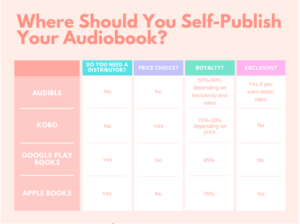
Audiobook Distribution: Where Should You Self-Publish Your Audiobook?
During a class (Publishing Technology Project) in my Masters of Publishing at SFU, I focused my time on audiobook production. Doing this project sparked my interest in audiobook distribution and how someone who self-publishes can include their self-published books in audiobook publishing.
My main questions are:
Where can you self-publish your audiobooks?
How self-published can they be?
Should you self-publish your audiobooks?
To answer the last question, it really depends. You have to answer a few questions of your own first, specifically, do you have the money and do you have the time. Creating an audiobook is extremely time-consuming, and if you are doing everything yourself, you may save on money, but you will be losing out on time. If you are going to spend all of that time and/or money, you have to wonder if you will be making any of that money back. In his article, “Do it Yourself: A 10-Step Guide to Self-Publishing an Audiobook,” Warren Adler explains it perfectly: “you must decide if the audiobook market will be lucrative enough for your books.”
An article in Publishers Weekly by Allison Schiff breaks down the costs well, explaining what it costs if you use different production companies to help with your eBook, such as Infinity Publishing or Dog Ear Publishing or how much it could cost to hire a voice actor. She explains that turning your regular novel into an audiobook could take 60 hours or more, and you should expect to “shell out a minimum of $3,000 to $4,000 for the completed product”. This can be a wake-up call for anyone who thinks they can just purchase a microphone and read their audiobook directly into their computer.
However, suppose you still want to self-publish your audiobook because you understand that your audience is busy and would seriously enjoy it while going about their daily lives. In that case, you should know where and how you can self-publish.
Apple Books
Apple Books (formally known as iBooks) is an eBook reading application by Apple Inc. for its operating systems.
With Apple Books, you can self-publish your audiobook, but you have to work with one of Apple Books’ preferred partners to publish and manage your audiobook. Depending on where you are located and who you go through, they can also help create the audiobook. These partners are aggregators that will help you format, deliver and manage the audiobooks. These preferred partners take a percentage of your sales on top of what Apple Books takes.
Although you can self-publish your audiobook with Apple Books, you cannot do it entirely on your own by uploading it directly; you have to use a distributor. Many of these distributors, such as Findaway Voices, will say they are “delivering your audiobooks directly to Apple Books.” You also can “suggest” the list price for your audiobook, but ultimately Apple Books gets to choose and will most likely price match, but they do not have exclusivity requirements.
Google Play Books
Google Play Books (formerly known as Google eBooks) distributes eBooks through the Google Play app.
Like Apple Books, Google Play hasn’t been known as a great place to self-publish, and up until 2020, you actually had to go through an “approval period” to get your book on the Google Play Books store. Nowadays, it works more similarly to Amazon. Also, similarly to Apple Books, you cannot publish your audiobook directly to Google Play Books, and you have to go through an aggregator. Findaway Voices is Google Plays distribution partner, so the good thing is if you go through Findaway Voices, you can get your book both on Apple Books and Google Play Books and any of their other partner stores.
Kobo
Rakuten Kobo Inc. is a Canadian company that sells ebooks, audiobooks and eReaders.
I argue that they have the most straightforward self-publishing process as you can upload your audiobook using your Kobo Writing Life account. Like an eBook, you upload the file, describe the book, upload a cover image, create a table of contents, enter your pricing, and your audiobook will publish within the next 72 hours. You also do not have to give exclusivity (similar to Apple Books and Google Play Books).
Kobo has the only system where you have total control over the pricing, and you get full royalty, unlike if you were to go through a distributor. It is unclear if you can use Findaway Voices and Kobo for the same Audiobook since Findaway Voices also partners with Kobo.
Although this seems like the best option, it is not without problems. On my account, since I have never published an eBook with Kobo, I do not have the option to publish an Audiobook. This seems to be an ongoing glitch, and intentional or not, many people are describing the same issue.
Audible
Audible, owned by Amazon, is the most commonly used audiobook service where you can purchase and stream audiobooks and other spoken content.
The ACX platform is Audible’s audiobook self-publishing platform. Like Amazon and Kindle Direct Publishing, Audible promotes and encourages self-publishing as Amazon tends to be the leader in this field. The process of publishing is simple. Sign up, claim your book, fill out the details and upload the files.
The royalty model for Audible’s audiobooks proves how much Amazon is pushing the self-publishing of audiobooks. As audiobook author Tim Grahl’s article on Booklaunch explains, you start at 50% royalty, but you can get as high as 90% royalty the more your sales go up. You also get $25 if your book is one of the first three books someone purchases on Audible. But something to be aware of is you cannot choose your pricing. This royalty rate is only if you are self-publishing; however, if you have a publisher, they get 25% of your 50%. This is also only if you are exclusive with Audible; your royalty lowers if you choose to make an unexclusive contract.
Breaking it Down

Which Route Should You Take?
The good thing is you DO have options if you want to self-publish your audiobook, and it is up to you to choose which route you think is best for you and your book. If you’re going to self-publish and you are Canadian, I would go with Kobo, but there are also other options.
If you already have an audience, you can go with Patreon, as you can post audio files directly to the site. Of course, Patreon is getting some of your subscription money; however, this way, you can control a lot more about the presentation and price of the audiobook.
And, if you are benevolent and want to give away your audiobook for free, you can always post the file on Soundcloud.
Bibliography
“ACX.” n.d. Www.acx.com. Accessed March 29, 2022. https://www.acx.com/help/200498770.
Adler, Warren. 2017. “Do It Yourself: A 10-Step Guide to Self-Publishing an Audiobook.” Thewritelife.com. August 18, 2017. https://thewritelife.com/self-publishing-an-audiobook/.
“Apple Books for Authors.” n.d. Authors.apple.com. Accessed March 29, 2022. https://authors.apple.com/audiobooks.
Dan, Kane. 2020a. “How to Publish an Audiobook on Google Play.” Naturally Voice. March 31, 2020. https://naturallyvoice.com/how-to-publish-an-audiobook-on-google-play/.
———. 2020b. “How to Publish an Audiobook on ITunes.” Naturally Voice. April 4, 2020. https://naturallyvoice.com/how-to-publish-an-audiobook-on-itunes/.
Haines, Derek. 2018. “How to Self-Publish Audiobooks and Why You Should Do It.” Just Publishing Advice for Writers and Authors. January 4, 2018. https://justpublishingadvice.com/are-you-self-publishing-audiobooks-why-you-should-be/.
Hoffelder, Nate. 2019. “Is Anyone Else Not Seeing the New Audiobook Section in Kobo Writing Life?” The Digital Reader. October 1, 2019. https://the-digital-reader.com/2019/10/01/is-anyone-else-not-seeing-the-new-audiobook-section-in-kobo-writing-life/.
“How to Publish on Google Play Books in 2021.” 2020. Reedsy. 2020. https://blog.reedsy.com/how-to-publish-a-book-on-google-play/.
“How to Self-Publish an Audiobook | the Creative Penn.” 2017. Www.thecreativepenn.com. October 20, 2017. https://www.thecreativepenn.com/how-to-self-publish-an-audiobook/.
Life, Kobo Writing. 2019. “Break into New Markets: Kobo Writing Life Launches Audiobook Uploads.” Kobo Writing Life. September 27, 2019. https://kobowritinglife.com/2019/09/27/breaking-news-kobo-writing-life-launches-direct-audiobook-upload/.
Packer, Roger. 2019. “Self-Publishers Can Go Direct with Audiobooks to Kobo.” Roger Packer. October 22, 2019. https://rogerpacker.com/self-publishers-can-go-direct-with-audiobooks-to-kobo/.
“Publisher and Author Help – Apple Books Partner Support.” n.d. Itunespartner.apple.com. Accessed March 29, 2022. https://itunespartner.apple.com/books/partner-search.
“Publisher Program Policies for Audiobooks on Google Play – Google Play Books Partner Center Help.” n.d. Support.google.com. Accessed March 29, 2022. https://support.google.com/books/partner/answer/7626222?hl=en.
Renton, Catherine. 2020. “How to Listen to Audiobooks and Where to Get Them: Beginner’s Guide.” NBC News. 2020. https://www.nbcnews.com/select/shopping/audiobooks-guide-how-listen-audiobook-ncna1134076.
Schiff |, Allison. 2015. “DIY: How to Self-Publish an Audiobook.” PublishersWeekly.com. 2015. https://www.publishersweekly.com/pw/by-topic/authors/pw-select/article/65937-diy-self-publishing-audiobooks.html.
Williams, Mark. 2019. “Self-Published Authors Can Now Upload Their Audiobooks Direct to Kobo via Kobo Writing Life.” The New Publishing Standard. September 26, 2019. https://thenewpublishingstandard.com/2019/09/27/self-published-authors-can-now-upload-their-audiobooks-direct-to-kobo-via-kobo-writing-life/.



